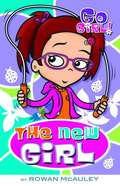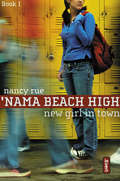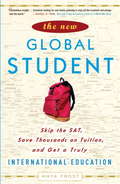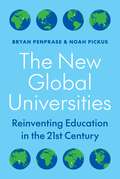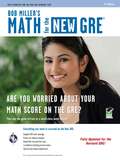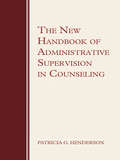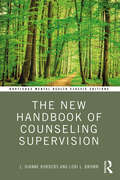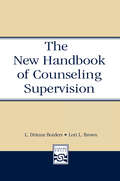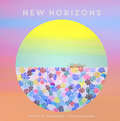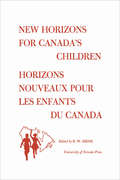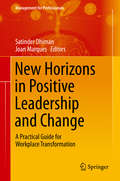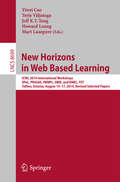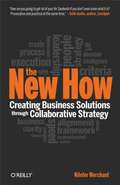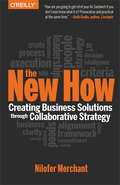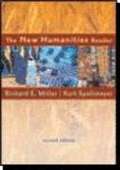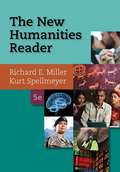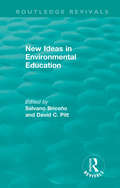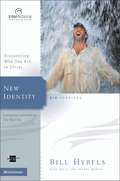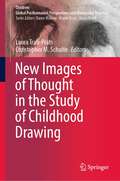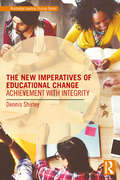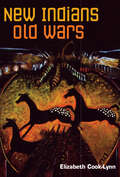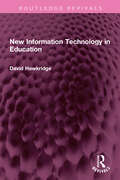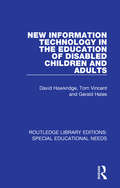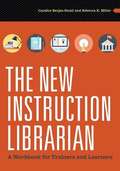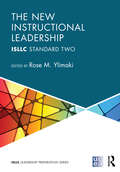- Table View
- List View
The New Girl (Go Girl! #9)
by Rowan McauleyZoe can't wait to meet Isabelle, the new girl. What will she be like, and will they be friends? But when Isabelle starts being really mean, Zoe has to choose between being mean too, or standing tall and being a good friend.
New Girl in Town
by Nancy RueA series of books for mid-teens, dealing with the challenges, problems and excitement of becoming young women of faith. In the first book, Laura Duffy's family moves to Satellite Beach, Florida, where she initially feels out of place at a high school where her good grades mark her as a nerd. Then a school counselor, Mrs. Isaacsen (who turns out to be a Christian student's best friend) establishes a once-a-week group for conflicted girls.
The New Global Student: Skip the SAT, Save Thousands on Tuition, and Get a Truly International Education
by Maya FrostThis inspirational how-to handbook illustrates how blending meaningful study abroad with personalized learning gives students extraordinary opportunities to reach new heights.
The New Global Universities: Reinventing Education in the 21st Century
by Bryan Penprase Noah PickusReimagining higher education around the world: lessons from the creation of eight new colleges and universities in Africa, Asia, the Middle East, and North AmericaHigher education is perpetually in crisis, buffeted by increasing costs and a perceived lack of return on investment, campus culture that is criticized for stifling debate on controversial topics, and a growing sense that the liberal arts are outmoded and irrelevant. Some observers even put higher education on the brink of death. The New Global Universities offers a counterargument, telling the story of educational leaders who have chosen not to give up on higher education but to reimagine it. The book chronicles the development and launch of eight innovative colleges and universities in Africa, Asia, the Middle East, and North America, describing the combination of intellectual courage, entrepreneurial audacity, and adaptive leadership needed to invent educational institutions today.The authors, both academic leaders who have been involved in launching ventures similar to the ones described, offer a unique inside perspective on these efforts. Bryan Penprase and Noah Pickus show how the founders of new colleges and universities establish distinctive brands in a sector dominated by centuries-old institutions, secure creative sources of funding, attract stellar faculty and students, and design appealing curriculums and campuses—all while managing tradeoffs and setbacks, balancing local needs and global aspirations, and wrestling with challenges to academic freedom. These new educational institutions include two universities in Asia and the Middle East built by well-established American parent institutions, others in Africa and North America that offer holistic reform from the ground up and leverage new technologies to lower costs, and still others that adapted the American liberal arts model to Asian and African contexts. Their experiences offer lessons for future founders of new universities—and for those who want to renew and rejuvenate existing ones.
New GRE, Miller's Math (Gre Test Preparation Ser.)
by Bob MillerIf you're worried about your math score on the new GRE, get the guide that teaches you everything you need to know! Bob Miller's Math for the New GRE Gets You into Grad School! Bob Miller has taught math to thousands of students at all educational levels for 30 years. His proven teaching methods help grad-school-bound students succeed on the math portion of the new GRE General Test. Written in a lively and unique format, Bob Miller's Math for the New GRE is fully aligned with the new GRE General Test that launched in August 2011. This book is the perfect study companion for anyone taking the new GRE General. Bob Miller addresses the changes to the content and format of the exam while teaching math in an easy-to-understand style. Unlike some dull test preps that merely present the material, Bob actually teaches and explains math concepts and ideas. His no-nonsense, no-stress teaching methods and decades of experience as a math teacher help you master the material and get an excellent score. The book contains everything GRE test-takers need to know to solve the math problems that typify the Quantitative section of the exam. Each chapter is devoted to a specific topic and is packed with examples and exercises that reinforce the required math skills. Bob Miller's Math for the New GRE is a must-have for anyone who needs to boost their math skills before taking the new GRE!
The New Handbook of Administrative Supervision in Counseling
by Patricia G. HendersonSponsored by the Association for Counselor Education and Supervision. To deliver excellent, culturally responsive services to clients, a successful administrative supervisor must provide leadership to professional counselors, manage counseling services, and work effectively within their agency. The New Handbook of Administrative Supervision in Counseling is written for first line supervisors who work in mental health agencies, private practices, or in a schools. It highlights the skills needed to fulfill eighteen job responsibilities such as implementing your vision, advocating for services and staff members, navigating the politics inherent in work environments, team building, managing budgets and other realities, while still maintaining your own professional integrity and development. Useful forms and self-directed exercises are provided to facilitate personal reflection.
The New Handbook of Counseling Supervision (Routledge Mental Health Classic Editions)
by L. DiAnne Borders Lori L. BrownThe classic edition of this groundbreaking book includes a new preface from the authors discussing developments in the field since the handbook’s initial publication. Chapters provide an overview of best principles and best practices in counseling supervision process, one that is firmly rooted in the recent explosion of empirical research in this field. Sponsored by the Association for Counselor Education and Supervision (ACES), the book is targeted primarily at master's-level practitioners who want practical, how-to applications of the research literature rather than a comprehensive review of the supervision literature. It's also a useful supplement for more academic texts used for doctoral-level instruction in counseling supervision.
The New Handbook of Counseling Supervision
by Lori L. Brown L. DiAnne BordersThe second edition of this ground-breaking book continues the mission of its predecessor: to provide a "best principles" and "best practices" overview of the counseling supervision process, one that is firmly rooted in the recent explosion of empirical research in this field. Sponsored by the Association for Counselor Education and Supervision (ACES), the presentation is targeted primarily at master's-level practitioners who want "how-to" applications of the research literature (with examples) rather than a comprehensive review of the supervision literature. Like the first edition, this revised book is also a useful supplement for more academic texts used for doctoral-level instruction in counseling supervision.Key changes in this new edition include greater attention to multicultural and diversity issues and new chapters on group supervision and on technology. Also new are discussion questions and vignettes meant to enhance application of key concepts in each chapter as well as more sample materials and forms for practice.
New Horizons: The Art Of Wandering
by Shirin SahbaThis vibrant and entrancing book invites readers on a journey around the world. Artist and globetrotter Shirin Sahba celebrates the diversity of people, places, and traditions, and revels in the joy of the journey itself. In exquisitely detailed paintings, she captures fleeting moments and small treasures—a brightly colored sari fluttering in the breeze, a mother and child enjoying gelatos on a hot Italian day, the mesmerizing pattern of an antique Chinese carpet. Along the way, the artist shares reflections, inspirations, and stories, immersing readers in each new landscape. This ebook is perfect for nomads, graduates, retirees, or anyone setting off in search of their own new horizons.
New Horizons for Canada's Children/Horizons Nouveaux pour les Enfants du Canada: Proceedings of the first Canadian Conference on Children/Deliberations de la premiere Conference Canadienna de l'Enfance
by B. HeiseThe first Canadian Conference on Children, held in the province of Quebec in October, 1960, was the culmination of several years of planning and of three years' specific study of projects which dealt with existing programmes for children in Canada. Delegates came from provincial and national organizations and the Conference was supported by a large number of organizations connected with child health, welfare, and education. The programme of the Conference was divided into three sections: plenary sessions, group discussions of the projects, and group discussion of children under three headings: "the early years," "the middle years," and "the transition years." The whole programme covered children from birth to about the age of seventeen. The Proceedings includes the speeches presented at the plenary sessions (by Sir Geoffrey Vickers, Chairman of the Research Committee of the British Mental Health Research Fund; Dr. K.D. Naegele of the University of British Columbia; and Dr. Otto Klineberg of Columbia University); and valuable summaries of discussions by Dr. Murray Ross (York University), Mgr. Irénée Lussier (Université de Montréal), and Dr. N.A.M. MacKenzie (University of British Columbia).
New Horizons in Positive Leadership and Change: A Practical Guide for Workplace Transformation (Management for Professionals)
by Satinder Dhiman Joan MarquesThis edited volume provides managers, as well as students, with the best practices in effectively leading the 21st century workforce and managing change. It applies positive principles arising from the newly emerging fields of positive psychology, positive change, and positive organizational studies to the field of leadership and change; offering managers strategies and tools to lead change effectively, in the present-day boundary-less work environment. At its most fundamental level, the uniqueness of this volume lies in its anchorage in the moral and spiritual dimension of leadership, an approach most relevant for contemporary organizations.
New Horizons in Web Based Learning
by Yiwei Cao Terje Väljataga Jeff K.T. Tang Howard Leung Mart LaanpereThis book constitutes the revised selected papers of the workshops of the 13th International Conference of Web-based Learning, ICWL 2014, held in Tallinn, Estonia, in August 2014. This volume comprises papers of six workshops: 1. The Seventh International Workshop on Social and Personal Computing for Web-Supported Learning Communities (SPeL 2014) 2. The First International Workshop on Peer-Review, Peer-Assessment, and Self-Assessment in Education (PRASAE 2014) 3. International Workshop on Mobile and Personalized Learning (IWMPL 2014) 4. The First International Workshop on Open Badges in Education (OBIE 2014) 5. The Fourth International Symposium on Knowledge Management & E-Learning (KMEL 2014) 6. The Future of e-Textbooks Workshop (FeT 2014).
The New How
by Nilofer MerchantWhat people are saying about The New How "How are you going to get rid of your Air Sandwich if you don't even know what it is? Provocative and practical at the same time." --Seth Godin, author of Linchpin "The New How is informative and provides exciting insights because the suggestions are practical and doable. Merchant gets the new reality--leadership fails not so much from flawed strategy as it does from failed processes of engagement from those responsible for implementing the strategy. In high-performing organizations, everyone acts like a leader, and they own the strategy and take actions to ensure its success. If you care about making a difference, read this book." --Barry Posner, author of The Leadership Challenge "Collaboration is a powerful, competitive weapon: this book shows you how to use it to win markets." --Mark Interrante, VP Content Products, Yahoo, Inc. "In a world in which the pace of change is ever quickening, collaboration, not control, is the route to a successful organization. This book tells you how to make your organization collaborative. And Nilofer Merchant's writing is a model of clarity." --Barry Schwartz, author of The Paradox of Choice: Why More Is Less "Want to transform your organization into a collaborative enterprise? Nilofer Merchant provides insightful and practical strategies in The New How." --Padmasree Warrior, CTO, Cisco Systems, Inc. "Merchant's book is a practical guide for the journey from strategy to implementation. The collaborative tools described here can help companies reach strategic success--and avoid pitfalls along the way." --Tom Kelley, General Manager, IDEO, and author of Ten Faces of InnovationOnce in a generation, a book comes along that transforms the business landscape. For today's business leaders, The New How redefines the way companies create strategies and win new markets. Management gurus have always said "people matter." But those same gurus still relegate strategy to an elite set of executives who focus on frameworks, long presentations, and hierarchical approaches. Business strategy typically has been planned by corporate chiefs in annual meetings, and then dictated to managers to carry out. The New How turns that notion on its head. After many years of working with Apple, Adobe, HP, and many other companies, Nilofer Merchant discovered the secret sauce: the best way to create a winning strategy is to include employees at all levels, helping to create strategy they not only believe in, but are also equipped to implement. In The New How, Nilofer shows today's corporate directors, executives, and managers how they can transform their traditional, top-down approach to strategy planning and execution into collaborative "stratecution" that has proven to be significantly more effective. Enhance performance and outcomes by deflating the "air sandwich" between executives in the boardroom and employees Recognize that strategy and execution are thoroughly intertwined Understand how successful strategy is founded in effective idea selection-a pile of good ideas doesn't necessarily build good strategy Create company strategy and link it to targeted execution, using the practical models and techniques provided
The New How [Paperback]: Creating Business Solutions Through Collaborative Strategy
by Nilofer MerchantWhat people are saying about The New How "How are you going to get rid of your Air Sandwich if you don't even know what it is? Provocative and practical at the same time."--Seth Godin, author of Linchpin" The New How is informative and provides exciting insights because the suggestions are practical and doable. Merchant gets the new reality--leadership fails not so much from flawed strategy as it does from failed processes of engagement from those responsible for implementing the strategy. In high-performing organizations, everyone acts like a leader, and they own the strategy and take actions to ensure its success. If you care about making a difference, read this book."--Barry Posner, author of The Leadership Challenge"Collaboration is a powerful, competitive weapon: this book shows you how to use it to win markets."--Mark Interrante, VP Content Products, Yahoo, Inc."In a world in which the pace of change is ever quickening, collaboration, not control, is the route to a successful organization. This book tells you how to make your organization collaborative. And Nilofer Merchant's writing is a model of clarity."--Barry Schwartz, author of The Paradox of Choice: Why More Is Less"Want to transform your organization into a collaborative enterprise? Nilofer Merchant provides insightful and practical strategies in The New How."--Padmasree Warrior, CTO, Cisco Systems, Inc."Merchant's book is a practical guide for the journey from strategy to implementation. The collaborative tools described here can help companies reach strategic success--and avoid pitfalls along the way."--Tom Kelley, General Manager, IDEO, and author of Ten Faces of InnovationOnce in a generation, a book comes along that transforms the business landscape. For today's business leaders, The New How redefines the way companies create strategies and win new markets.Management gurus have always said "people matter." But those same gurus still relegate strategy to an elite set of executives who focus on frameworks, long presentations, and hierarchical approaches. Business strategy typically has been planned by corporate chiefs in annual meetings, and then dictated to managers to carry out. The New How turns that notion on its head. After many years of working with Apple, Adobe, HP, and many other companies, Nilofer Merchant discovered the secret sauce: the best way to create a winning strategy is to include employees at all levels, helping to create strategy they not only believe in, but are also equipped to implement.In The New How, Nilofer shows today's corporate directors, executives, and managers how they can transform their traditional, top-down approach to strategy planning and execution into collaborative "stratecution" that has proven to be significantly more effective. Enhance performance and outcomes by deflating the "air sandwich" between executives in the boardroom and employees Recognize that strategy and execution are thoroughly intertwined Understand how successful strategy is founded in effective idea selection-a pile of good ideas doesn't necessarily build good strategy Create company strategy and link it to targeted execution, using the practical models and techniques provided
New Humanities Reader
by Richard E. Mitler Kurt SpellmeyerThe New Humanities Reader presents 32 challenging and important essays from diverse fields that address current global issues. The authors contend that there is a crisis within the humanities today due to specialization within narrow fields of scholarship, resulting in a higher education system that produces students who lack the general cross-disciplinary knowledge needed to better understand today's complex world. The selections encourage students to synthesize and think critically about ideas and research formerly kept apart. This approach challenges readers to resist mimetic thinking and instead creatively connect ideas to help them understand and retain what they read. Through this process of reading, discussing, and writing, students develop the analytical skills necessary to become informed citizens. Focused on today's issues, the selections represent both well-known nonfiction authors and newly published writers and are drawn from such periodicals as The New Yorker and Natural History and from best-selling books including Reading Lolita in Tehran, Fast Food Nation, and Into the Wild. Students will be engaged by reading and rereading, analyzing and working with these selections not simply because they are models of good writing, but because they are also deeply thought-provoking pieces that invite readers to respond.
The New Humanities Reader (Fifth Edition)
by Richard E. Miller Kurt SpellmeyerTHE NEW HUMANITIES READER presents 25 challenging and important essays from diverse fields that address current global issues. This cross-disciplinary anthology helps readers attain the analytical skills necessary to become informed citizens. Ideas and research from wide-ranging sources provide opportunities for readers to synthesize materials and formulate their own ideas and solutions. The thought-provoking selections engage and encourage readers to make connections for themselves as they think, read, and write about the events that are likely to shape their lives. The fifth edition includes nearly 50 percent new reading selections, which continue to make this text current, globally oriented, interdisciplinary, and probing.
New Ideas in Environmental Education (Routledge Revivals)
by Sálvano Briceño David C. PittOriginally published in 1988, this book was a plea for new approaches to environmental education. In the years prior to publication there had been a reappraisal of education and a growing awareness of the problems of environment and development. However, the movements had rarely met. The objective of this book was to present some of the ideas and the action that was taking place at the time. It was put forward for discussion because a major intergovernmental meeting took place in 1987, ten years on from the famous Tbilisi meeting, the world's first intergovernmental conference on environmental education. With environmental education still very much on the world’s agenda today, this title can be used as a resource to show where it all began.
New Identity
by Bill Hybels Kevin HarneyDiscover an identity that fits you for kingdom service. As a Christian, you have received more than God's forgiveness. You also have a brand new identity! You are a new creation in Christ, with fresh and exciting privileges and responsibilities. And God wants you to walk confidently in this identity, serving Him with joy and energy in your various roles as • A son or daughter of God • A saint of God • A soldier of God • An ambassador of God • A friend of God • A manager of God's resources New Identity gives you a close-up view of these different roles and equips you with the sound biblical insights you need to fulfill them. You'll discover new ways to make your citizenship in God's kingdom a daily reality right where you live. Interactions—a powerful and challenging tool for building deep relationships between you and your group members, and you and God. Interactions is far more than another group Bible study. It's a cutting-edge series designed to help small group participants develop into fully devoted followers of Christ.
New Images of Thought in the Study of Childhood Drawing (Children: Global Posthumanist Perspectives and Materialist Theories)
by Laura Trafí-Prats Christopher M. SchulteThis book provides a revitalised account of the study of children’s drawing by outlining a departure from existing approaches privileging developmentalist accounts and presenting drawing as a specialised human endeavour separated from other material entanglements constituting children’s everyday experiences. The book takes on current developments in the fields of early childhood arts and early childhood literacies to advocate for process-oriented, new materialist and decolonial approaches that re-conceptualise the study of children’s drawing. It proposes a future-oriented approach, centred on thinking experimentally with a focus on nonrepresentational elements, such as movement, sensation, intensity, rhythm, story and place, which singularly assemble in drawing events. Thus, the book discusses drawing as a process of sense-making that is not enclosed in the individualised body of the child and that unfolds corporeally in time and space. It revises the relation of drawing with symbolisation by suggesting that the use of language and signs in drawing form in entanglement with matter and sensation in processes of creative speculation connected with the movement of thought. Presenting a series of contributions by internationally recognised scholars and artists, the book aims to create synergies between theory and practice that speak of everyday realities interconnecting children, learning and sense-making.
The New Imperatives of Educational Change: Achievement with Integrity (Routledge Leading Change Series)
by Dennis ShirleyThe New Imperatives of Educational Change is a clarion call to move beyond the standardized testing and marketplace competition that have become pervasive in school systems to focus instead on creating the conditions that will encourage all students to become critical and independent thinkers. Dennis Shirley presents five new imperatives to guide educators and policymakers towards a re-thinking of what it means to teach effectively and to learn in depth. The evidentiary imperative requires educators to attain a better grasp of what data actually reveal about international trends in student learning. The interpretive imperative encourages mindful deliberation before acting on evidence in order to promote the integrity of a school community. The professional imperative describes new international research findings on promising pedagogies and curricula that propel learning in new directions. The global imperative argues that we all must look beyond our national boundaries to improve the flourishing of all young people, wherever they may be found. Finally, the existential imperative reminds us that students look to their teachers as role models who can dignify learning with meaning and embellish life with joy. Visionary in its scope and practical in its details, The New Imperatives of Educational Change is an indispensable road map for all teachers, principals, and system leaders.
New Indians, Old Wars
by Elizabeth Cook-LynnChallenging received American history and forging a new path for Native American studies Addressing Native American Studies' past, present, and future, the essays in New Indians, Old Wars tackle the discipline head-on, presenting a radical revision of the popular view of the American West in the process. Instead of luxuriating in its past glories or accepting the widespread historians' view of the West as a shared place, Elizabeth Cook-Lynn argues that it should be fundamentally understood as stolen. Firmly grounded in the reality of a painful past, Cook-Lynn understands the story of the American West as teaching the political language of land theft and tyranny. She argues that to remedy this situation, Native American studies must be considered and pursued as its own discipline, rather than as a subset of history or anthropology. She makes an impassioned claim that such a shift, not merely an institutional or theoretical change, could allow Native American studies to play an important role in defending the sovereignty of indigenous nations today.
New Information Technology in Education (Routledge Revivals #32)
by David HawkridgeFirst published in 1983, New Information Technology in Education surveyed developments in the field of information technology and demonstrated how it could be used to improve the quality of education. The book considered the experience of a wide range of countries, including the United States, Japan and those in Europe. While explaining the potential improvements that the new technology could bring, this book also reviewed the problem areas and helped educationalists to evaluate the relevance of the new technology for their own work. In an age of teaching via Zoom videos, it is interesting to take a look at a time when information technology in education was at its nascent stage. This book will be of interest to teachers and students of history, education, technology and pedagogy.
New Information Technology in the Education of Disabled Children and Adults (Routledge Library Editions: Special Educational Needs #32)
by David Hawkridge Tom Vincent Gerald HalesFirst published in 1985. Information technology can offer huge benefits to the disabled. It can help many disabled people to overcome barriers of time and space and to a much greater extent it can help them to overcome barriers of communication. In that way new information technology offers opportunities to neutralise the worst effects of many kinds of disablement. This book reviews the possibilities of using information technology in the education of the disabled. Commencing with an assessment of the learning problems faced by disabled people, it goes on to look at the scope of information technology and how it has been used for the education of students of all ages, particularly in the United Kingdom and the United States. A penultimate section considers most of the contentious issues that faced users of technology, whilst the conclusion devotes itself to the immediate and longer-term future, suggesting possible future trends and the consequent problems that may arise.
The New Instruction Librarian: A Workbook for Trainers and Learners
by Candice M. Benjes-Small Rebecca K. Miller<p>The sheer amount of resources on the subject of information literacy is staggering. Yet a comprehensive but concise roadmap specifically for librarians who are new to instruction, or who are charged with training someone who is, has remained elusive. Until now. This book cuts through the jargon and rhetoric to ease the transition into library instruction, offering support to all those involved, including library supervisors, colleagues, and trainees. Grounded in research on teaching and learning from numerous disciplines, not just library literature, this book: <p> <li>shows how to set up new instruction librarians for success, with advice on completing an environmental scan, strategies for recruiting efficiently, and a training checklist; <li>walks readers step by step through training a new hire or someone new to instruction, complete with hands-on activities and examples; <li>explores the different roles an instruction librarian is usually expected to play, such as educator, project manager, instructional designer, and teaching partner; <li>demonstrates the importance of performance evaluation and management, including assessment and continuing education, both formal and informal; and <li>provides guided reading lists for further in-depth study of a topic.</li> <p> <p>A starter kit for librarians new to instruction, this resource will be useful for training coordinators as well as for self-training.</p>
The New Instructional Leadership: ISLLC Standard Two (PSEL/NELP Leadership Preparation)
by Rose M. YlimakiCo-published with UCEA, this exciting new textbook is the first to tackle the ISLLC Standard 2—Instructional Leadership. In light of recent curriculum reforms, accountability policies, and changing demographics, today’s leaders must not only have expertise in culture building and supervision skills, but also in adult learning, cultural funds of knowledge, curriculum, and the role of politics. The New Instructional Leadership helps aspiring school leaders examine their beliefs and practices about instructional leadership in relation to ISLLC Standard 2 and provides the theory, learning experiences, and analytical tools for effective leadership in today’s world. Chapters cover issues of collaboration, curricular programming, motivation, supervision, accountability, capacity building, use of technology, monitoring, and evaluation. Special Features: Case Studies—encourage readers to reflect and actively engage with instructional leadership beliefs and practices. Fieldwork and Extended Reflections—a range of inquiry activities provide students with opportunities to consider problems of practice related to the standard. Strategies for Leaders—offers students practical and accessible ideas in order to transform their practice to address the complex challenges facing contemporary schools. Theoretically grounded and research-based, this unique volume will help aspiring and current leaders to understand instructional leadership and help them to sustain strong curricular and instructional programs in their increasingly diverse schools and communities.
